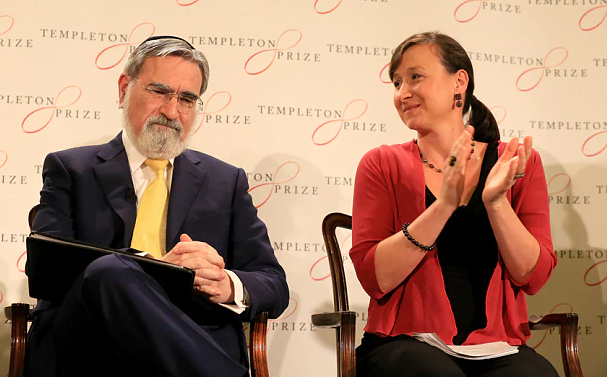But in practice it was the Haredi he found himself placating most: avoiding gay groups, doing little to advance the role of women, and his most regrettable mistake, refusing to attend the funeral of a much-loved Reform rabbi, Hugo Gryn, and calling him a destroyer of the faith. A great chief rabbi, to the Gentiles, a fair number said, noting his easier mixing with prime ministers and royals. The Haredi, not won over, called him "Boychik", wet behind the ears.
但實際上,他發現自己最安撫的是極端傳統猶太教徒:避開同性戀群體,他對提升女性的作用做得很少,他犯了一個最令人遺憾的錯誤,拒絕參加一位深受喜愛的改革派拉比的葬禮,雨果·格林,并稱他為信仰的毀滅者。一個偉大的拉比,對許多非猶太人而言,注意到他更容易與首相和皇室成員交往,極端正統派也沒有站在他這一邊,說他沒有經驗,太年輕。

Perhaps he was. He never set out to be a rabbi; the impulse had grown very slowly, from that first sense of the mystery of God, when he was two or three, in the sadness of the music at his grandfather's tiny synagogue in Finchley. He did not even feel especially Jewish until, at Cambridge, the Six-Day War of 1967 suddenly fuelled a lifelong attachment to Israel. He spent the next summer criss-crossing America on a Greyhound bus to look for rabbis, and Menachem Mendel Schneerson in Brooklyn, then the Lubavitcher rebbe, was the first to suggest he might be one himself and train in the mid-1970s. It was a voice in his head that made him say as as Abraham, ordered to sacrifice his son Isaac, had said three times to God, "Hineni", Here I am.
也許他是。他從來沒有打算成為一名拉比;從對上帝神秘的第一感覺開始,他的沖動變得非常緩慢,他兩三歲的時候,在他祖父芬奇利的小猶太教堂里,沉浸在音樂的悲傷之中。他甚至不覺得自己是猶太人,直到1967年的六日戰爭突然激起了他對以色列的終身依戀。第二年夏天,他在一輛灰狗巴士上橫穿美國尋找拉比,和布魯克林的梅納海姆·門德爾·施內爾森,后來成為了哈西德派領袖,他是第一個暗示自己會成為一名拉比,并在70年代中期開始訓練,他的頭腦中有一個聲音,正如亞伯拉罕吩咐他把兒子以撒獻祭,他曾三次對神說:“希尼尼,我在這里。”。
譯文由可可原創,僅供學習交流使用,未經許可請勿轉載。











